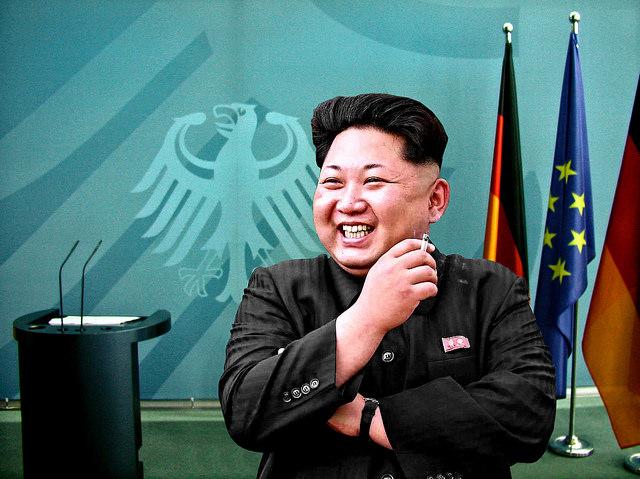What is Kim up to?
Posted By Ron Huisken on May 3, 2018 @ 14:30

The surging optimism about the imminent end of the Korean peninsula’s long reign as a global flashpoint is overwhelming the legions of realists and pessimists around the region. The new Kim Jong‑un is charming and erudite, seemingly impatient to get past the ugly debris of war and prolonged confrontation and step into an era of peace and harmony on the peninsula—even reunification could emerge as a real prospect.
For those directly responsible for testing these new political waters, a critical assessment is needed to gauge the sincerity of Kim’s suspiciously abrupt change in direction since approximately August or September 2017. First came the frantic and bellicose surge to perfect long-range delivery vehicles for nuclear warheads. Then we saw a similarly frantic, last-minute push to give the Winter Olympics in the South an ice-melting ‘unified Korea’ flavour, combined with follow-on summits with potentially transformative agendas.
People are complicated, but when speculating about Kim’s sincerity, there would appear to be three primary possibilities. The first is that Kim was genuinely wedded to developing an operational nuclear arsenal that he considered indispensable to North Korea’s long-term viability. But then something happened in the second half of 2017 that placed a big question mark over this national aspiration. What that might have been we don’t know, but there’s a great deal about North Korea that we don’t know.
The other two possibilities are based on the proposition that there was nothing spontaneous or impromptu about Kim’s change of direction. To the contrary, the change had been planned in the hope or expectation that the missile-test program would unfold successfully (which it did).
So one scenario stems from the idea that North Korea still has to demonstrate the ability to separate a warhead from a missile in space and survive re-entry through the atmosphere. This final development step is also the most dangerous in terms of the pressures or temptations it could generate for an American president to launch a pre-emptive surgical strike.
Under this scenario, the ‘peace offensive’ is designed to derail and deflate the pressure being applied on North Korea, force the US or South Korea to say ‘no deal’ and create a political window for an aggrieved North Korea to perfect this final capability in greater safety.
The other scenario stems from the possibility that Kim concluded some time ago that prior assessments of North Korea’s future as a nuclear-weapons state had simply been wrong. Nevertheless, he allowed the long and painful investment in developing nuclear capabilities to unfold as far as practicable in order to maximise North Korea’s negotiating leverage. But it does point to Kim being genuine in his preparedness to denuclearise.
This is a very primitive foray into the possible motives behind Kim’s conspicuous change in direction. On the other hand, much of the optimism on display seems to be the product of a somewhat reckless willingness to take the new images and statements at face value and to regard curiosity about Kim’s motives as superfluous.
Even if Kim is genuine–and I have argued earlier that this is a realistic possibility [1]—the current euphoria might still undergo a hard landing. Washington is pressing to load all the bases and hit a home run at the Trump–Kim summit, launching a highly condensed denuclearisation process that would strip North Korea of all traces of its nuclear program and associated delivery systems within two years. The experience with Libya in 2003 provides the example to follow.
Kim, on the other hand, has spoken of continuing to meet ‘frequently’ with the United States in order to build trust and confidence, suggesting that he has in mind a more prolonged step-by-step exercise.
A final point worth exploring in this context is the role of President Donald Trump. If anything of consequence emerges, Trump will get a great deal of the credit simply because it happened on his watch. In fact, praise—though probably not a Nobel Prize—seems warranted, on two grounds in particular.
The first is that the extravagant idiosyncrasies of Trump’s personality and associated style of governance presented both friends and adversaries with an entirely new and unprecedented array of risks and opportunities. In short, he made ‘business as usual’ very difficult. If any issue stood to benefit from a rude shake-up, it was the Korean peninsula.
Secondly, Trump zeroed in on China as the key player that had managed for too long to remain on the fringes of the issue and avoid any risky or costly policy settings that might have changed the calculus in Pyongyang in helpful ways. Trump failed to persuade China to really get stuck into the challenge, but the changes in China’s approach were nonetheless consequential.
More broadly, however, what is most different about this latest push to change the status quo on the Korean peninsula is the visibility of North Korea as the agent of change and its clear preference to work primarily with or through South Korea and the US, rather than through China.
My guess is that, alongside an official and still genuine enmity, this has a lot to do with American approachability, dependability and transparency, a legacy that Trump inherited and must now live up to and make the most of.
Article printed from The Strategist: https://aspistrategist.ru
URL to article: /what-is-kim-up-to/
URLs in this post:
[1] this is a realistic possibility: /might-kim-actually-want-cut-deal/
Click here to print.